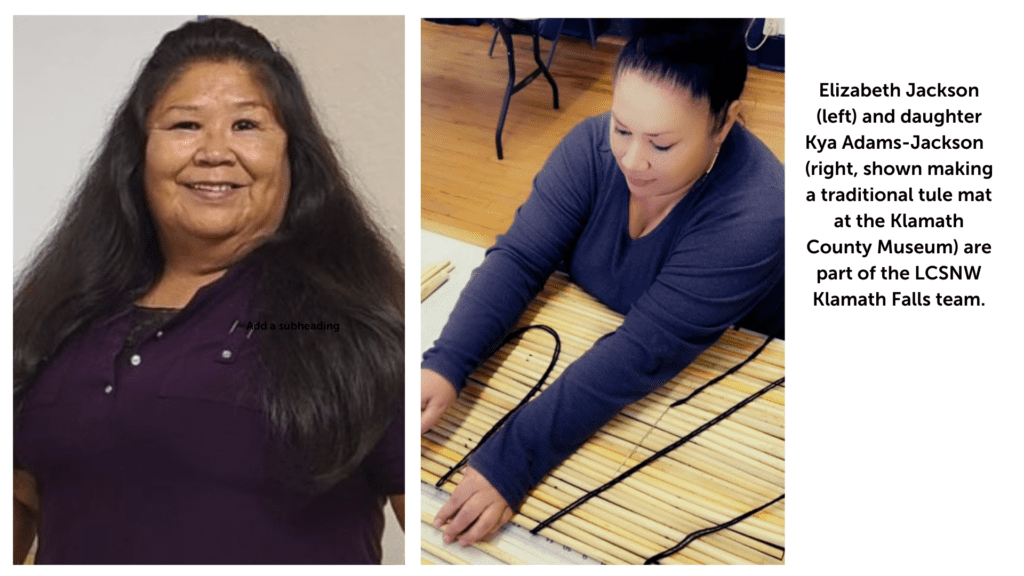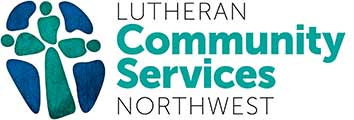Family, Tribal ties make our LCSNW team stronger in Klamath Falls
 Native American heritage means a lot to Elizabeth Jackson and Kya Adams-Jackson. The mother and daughter recently offered a glimpse into their family’s rich Tribal history, a welcome opportunity to learn about this culture as LCSNW observes Native American Heritage Month in November.
Native American heritage means a lot to Elizabeth Jackson and Kya Adams-Jackson. The mother and daughter recently offered a glimpse into their family’s rich Tribal history, a welcome opportunity to learn about this culture as LCSNW observes Native American Heritage Month in November.
Both women are valued members of the LCSNW staff in Klamath Falls, Oregon. Mom Elizabeth is lead receptionist at A Family Gathering Place relief nursery and for the main Klamath Falls office, a job she’s held for a year. Daughter Kya is a mental health intensive case manager on the Klamath engagement team, where she started almost 6 months ago.
Though fairly new to LCSNW, Elizabeth and Kya have deep roots in the Klamath Basin, both professionally and culturally. Their family name is embedded in centuries of Tribal lore that stretches from Southern Oregon into Northern California.
“Our blood goes all the way back,” Kya said. “Our tribe, the Modoc, has been here since the very beginning.”
The Klamath, Modoc and Yahooskin people groups are neighbors with distinct identities who now comprise the confederated Klamath Tribes. Terminated from federal recognition in the 1950s, the Klamath Tribes later had their rights restored in 1986.
Elizabeth’s grandfather was a Modoc chief and chairman. Her grandmother came from the Hupa Tribe of Northern California. Displaced for many years from the family’s traditional lands, Elizabeth returned to Klamath Falls in the early 1980s. Kya was born at that time. She traveled after her schooling and lived in Alaska and Montana; however, Kya decided there is no other place she would want to raise her own daughter than in Klamath Falls.
Kya is one of Elizabeth’s two children, daughter and son, both enrolled Tribal members. Elizabeth also has a granddaughter, age 17, and a grandson, 10, both deeply involved in Native American culture, activities, and sports.
Early in life, Kya developed a passion for the family’s Modoc history and culture. She and her daughter, a high school senior, spent a recent weekend crafting tule mats and pine needle baskets at the Klamath County Museum. “We hunt, fish, gather all tools and needed items, right around here locally.” She speaks knowledgeably about the treaty of 1864 that removed indigenous people from their lands east of the Cascades, and the war that ensued when a group of vastly outnumbered Modocs rebelled. She speaks hopefully about a resurgence of Modoc language instruction in local schools.
“It’s impressive to see my daughter be so involved and to be a leader in all of this,” Elizabeth said. “I am very proud.”
LCSNW is honored to have a strong partnership with the Klamath Tribes, who have supported the agency’s social service programs in Southern Oregon. LCSNW also enjoys good relationships with other Tribes around the Pacific Northwest. We remain grateful to the First Peoples who originally cultivated and inhabited the land upon which our buildings stand. In addition to Native American Heritage Month, we recognize the day after Thanksgiving as Native American Heritage Day.
